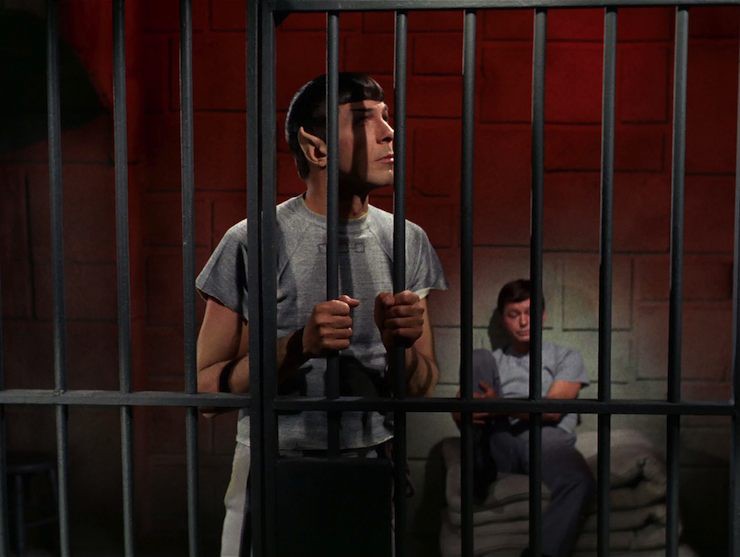“Bread and Circuses”
Written by Gene Roddenberry and Gene L. Coon
Directed by Ralph Senensky
Season 2, Episode 14
Production episode 60343
Original air date: March 15, 1968
Stardate: 4040.7
Captain’s log. The Enterprise has found debris that appears to be the remains of the S.S. Beagle, which has been missing for six years. Spock detects no bodies, so it’s possible the crew got to safety somewhere. Chekov computes the drift pattern of the debris and Spock traces it to the fourth planet of system 892.
The Beagle‘s shipmaster was R.M. Merik, who went to the Academy with Kirk, but who washed out in his fifth year and went into the merchant service.
The planet in question is Class M, appears to be early-to-mid-twentieth century equivalent in terms of technological development. Uhura is picking up amplitude and frequency modulations (AM/FM radio!), as well as TV broadcasts (she refers to it as something that used to be called “video,” and Spock pedantically corrects her by saying it was usually referred to as “television”). She picks up a news report of treasonous behavior among slaves, who are taken away and arrested. The sports report shows gladiatorial arena combat. The announcer mentions a bout in which a barbarian named William Harrison was killed, and Spock comments that Harrison was a member of the Beagle crew.
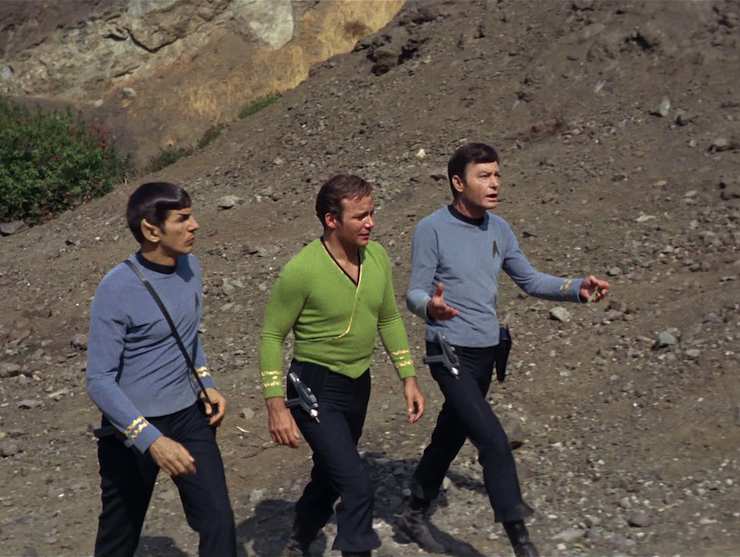
Kirk, Spock, and McCoy beam down to a hilly region outside the city where the TV broadcast came from. Because the Beagle was the first Federation ship to come out here, the Prime Directive is in full effect: no interference with the world, and no reference to space or the fact that there are other worlds with people on them.
The landing party is ambushed by four people with rifles, who speak colloquial twentieth-century English. Flavius, the leader of this foursome, wants to kill them, but brings them instead to his boss, Septimus, an older man who preaches peace. McCoy assures him that they’re peaceful as well, but Flavius doesn’t believe them.
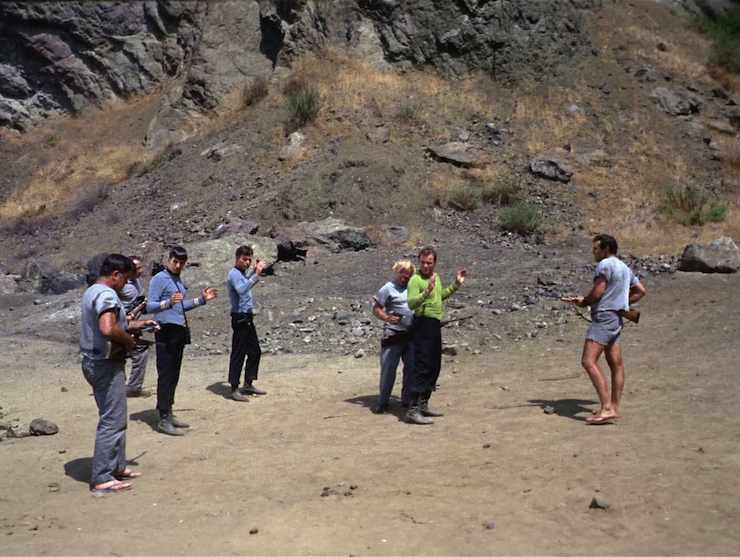
Spock explains that they’re seeking others similar to them: 47 who went missing six years ago. Flavius keeps insisting on killing the landing party, even though killing is wrong, because of the risk. The landing party found their hiding place.
Kirk contacts the Enterprise, and Scotty reveals that there are twelve people standing in their area. Septimus is impressed, and is now convinced that they’re not Romans, as the Romans don’t have any technology like that.
Septimus leads them to a cave system where his ragtag group of runaway slaves hide out from the Romans. Septimus himself used to be a senator, but he stopped worshipping the Roman gods like Jupiter and Mercury and changed to a more monotheistic worship that appears to be of the sun.
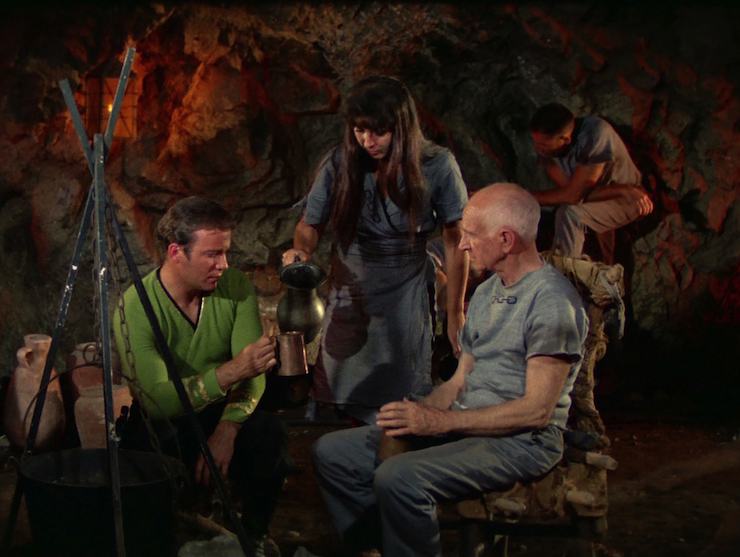
Kirk asks about Merik, and that gets everyone’s attention. Merikus is the First Citizen of Rome, who has been Lord of the Games for almost six years. The slaves do not think highly of him. Kirk explains that if he is First Citizen, he’s violated their people’s highest law and he must be punished.
Flavius agrees to guide them to the city, and Septimus will provide them with appropriate clothes. As they travel, Flavius tells his own story: he used to be one of the finest gladiators in the arena, but he too found religion and embraced peace over fighting.
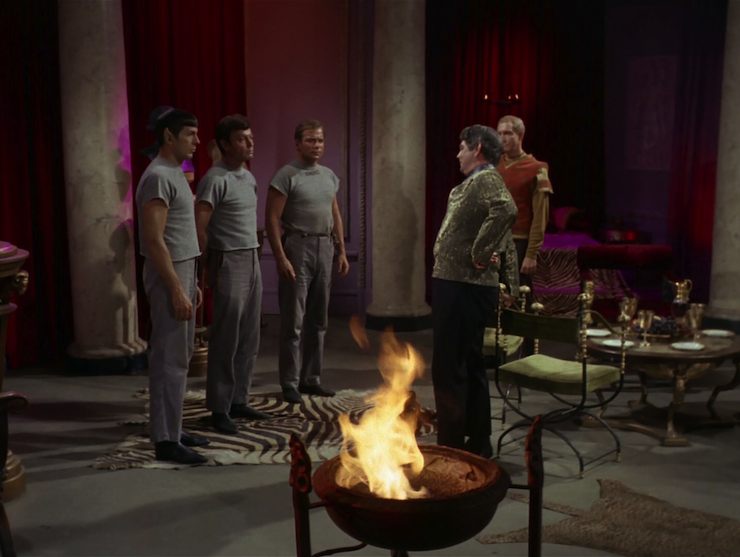
Then the cops show up and arrest them. The cop in charge is particularly thrilled to have recaptured Flavius Maximus. All four of them are hauled off to a prison cell. Kirk asks the cop to tell Merikus that Jim Kirk wants to see him. The cop sneers at him and locks them up.
Flavius explains that slaves used to rebel in the old days, but conditions improved, they got pensions and benefits and such, and discontent abated, but then many of them started to believe in peace and love and such, and they revolted once again.
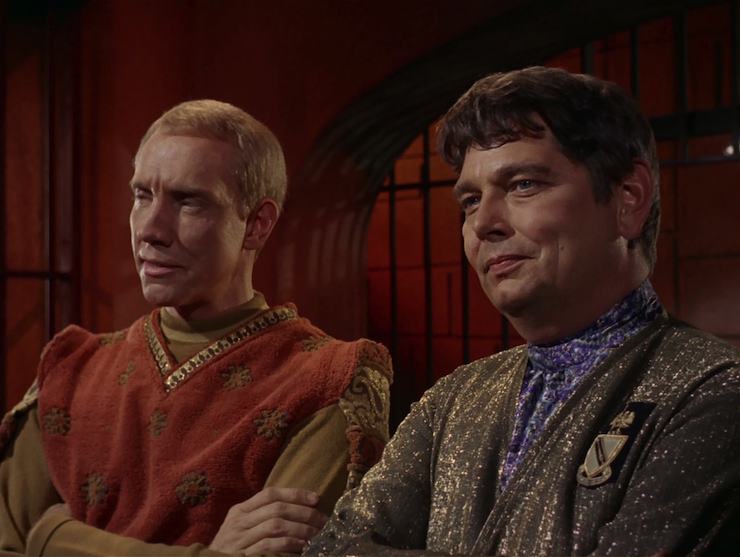
Flavius is taken away by the cops, and the other three are about to be taken away to another cell, but they make an escape attempt. Unfortunately, the cops had backup, which includes Merik as well as the Proconsul, Claudius Marcus. Claudius has all three taken to the palace. Claudius is also aware of who and what the landing party is, so they can speak freely.
Merik explains that the Beagle suffered meteor damage. They beamed down to find an ordered world that would not tolerate outside ideas. Merik made the decision to stay, scuttle the ship, and have the crew live on this world. Those who could adapt still live; those who couldn’t, died in the arena.
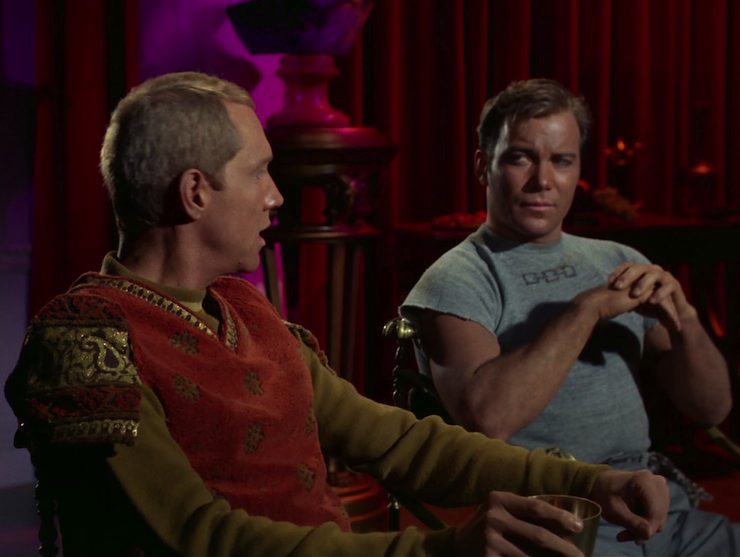
Claudius wants Kirk’s crew to beam down and join their society. Merik knows that they’ll beam down eventually to try to find the landing party after not checking in for a long time. Claudius hands Kirk a communicator, and then several cops put their guns to the landing party’s heads. Kirk tells Scotty, “condition green,” which is code for “we’re in trouble, but you can’t do anything about it.” Scotty is unwilling to completely sit on his hands, and orders Chekov to figure out what it would take to overload the planet’s power grid with the Enterprise.
Kirk is taken to the City Arena, which is a TV studio. Kirk sits in the Proconsul’s box with Claudius and Merik. The gladiatorial fighting is broadcast live, and the audience gets to pick the winner. Rather than an actual studio audience, a machine does cheering and jeering and applauding, and there’s an announcer calling the action.
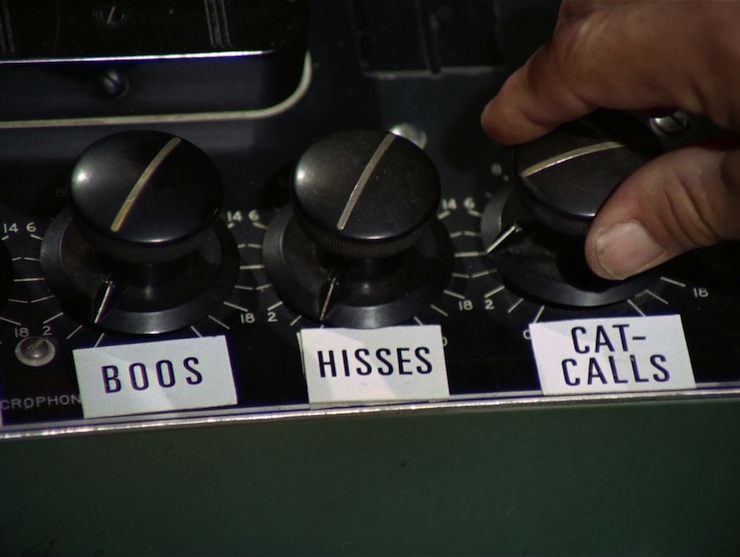
Spock and McCoy are brought out as barbarians to face two gladiators in uniform: Flavius is one of those two. Spock holds his own against his opponent, though he fights defensively. So does McCoy, but with far less skill—but Flavius refuses to fight McCoy with the same aggression, despite being whipped by the overseer.
Claudius thinks that Kirk should be disgusted by this, but Kirk just grins smugly and says that he’s seen stuff around the galaxy that makes this look like a folk dance. He’s also ordered members of his crew to their deaths to save others before. Claudius’s mistake is in thinking that Kirk is the same as Merik, not understanding that there’s a huge difference between the Academy washout who commands a merchant survey vessel and the decorated officer who commands a capital ship.
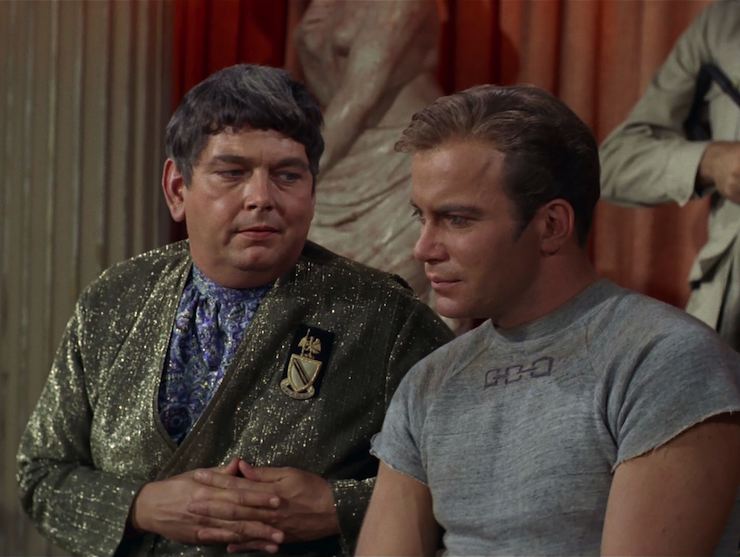
McCoy finally falls to Flavius, and Spock stops assing about and takes down his opponent in half a second, then doing the same to Flavius with a nerve pinch. The “crowd” boos, and the overseer asks for a decision regarding Spock’s foul. Claudius has them sent back to their cage; they’ll fight again, is all.
Claudius sends Kirk to his quarters, where his slave Drusilla is waiting for him, wearing a magnificently skimpy outfit. She has been instructed to be Kirk’s slave for the evening. Kirk is unimpressed, and says he refuses to perform for Claudius’s benefit.
In their cell, Spock tries to figure out a way to break out. McCoy accuses him of frustration, given that it’s the fifteenth time he’s tested the strength of the bars. McCoy tries to thank him for saving his life, and Spock blows it off as a logical exercise in not depriving the Enterprise of its chief medical officer. McCoy accuses Spock of not being afraid to die because he’s more afraid of living and having a real warm feeling burble up through the logic. Only then does Spock admit that he does have one warm feeling: worry about Kirk, and McCoy has that same one.
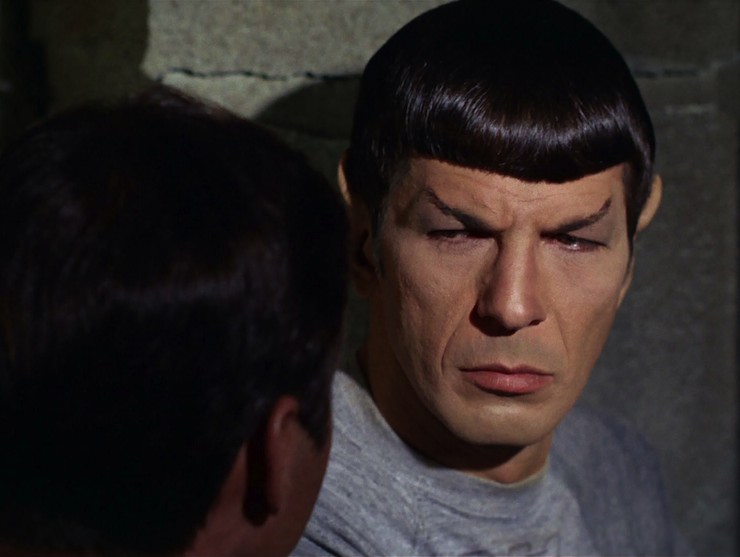
However, they needn’t be worried, as Kirk’s eating and drinking and smooching and canoodling with a hot blonde. He wakes up the next afternoon—wah-HEY!—to find Claudius, Merik, and two cops in the room. Claudius mentions that one of the communicators is missing. Claudius also explains that he sent Drusilla as a sort of parting gift, that as a man, Kirk deserved one last night of rumpy-pumpy. Claudius then kicks Merik out of the room, because a discussion between men is no place for him. (Burn!) Claudius explains that disobedience can’t be tolerated, and so Kirk will be executed in the arena. It’s a prime-time event, and it’ll get great ratings.
But then Flavius shows up and distracts the executioner, and then Scotty orders Chekov to black out the city. That causes enough confusion for Kirk and Flavius to take out the guards, though Flavius is killed. Kirk, armed with a weapon, heads down to the cell to spring Spock and McCoy. The cops attack, but Merik has the missing communicator, and he contacts the Enterprise. Claudius stabs him in the back, but it’s enough to get Kirk, Spock, and McCoy beamed back to the ship.
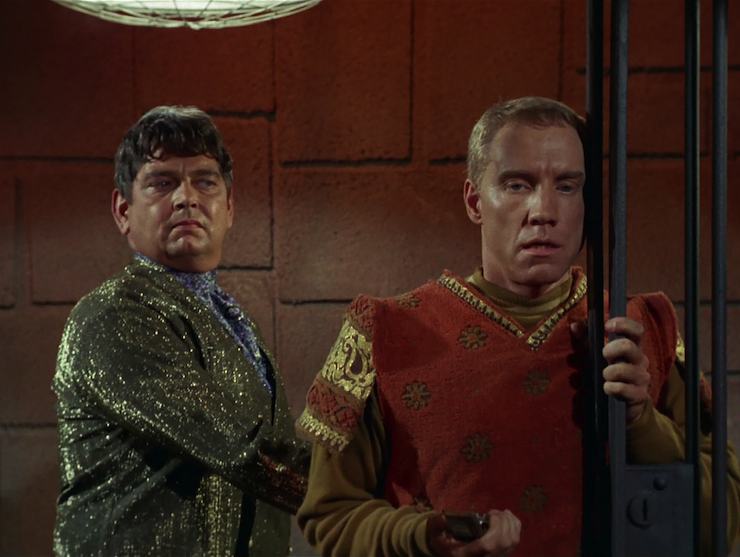
Kirk gives Scotty a commendation for his temporary blackout, which still keeps the Prime Directive obeyed and also saved the lives of the landing party. Spock says he wishes he could have observed this peace-and-love religion some more, as sun-worshippers don’t usually follow that track, but Uhura—who’s been listening to radio broadcasts—explains that it’s not worship of the sun in the sky but of the son of God. (Flavius had mentioned earlier that the religion first formed two thousand years ago, but it was suppressed for a long time.) Kirk realizes that they had Caesar, but they also had Christ, and he wonders how that will develop.
Fascinating. Spock tries very hard not to hurt the gladiator he’s fighting, a consideration that lasts right up until McCoy’s life is in danger. But he’s definitely holding back until then.
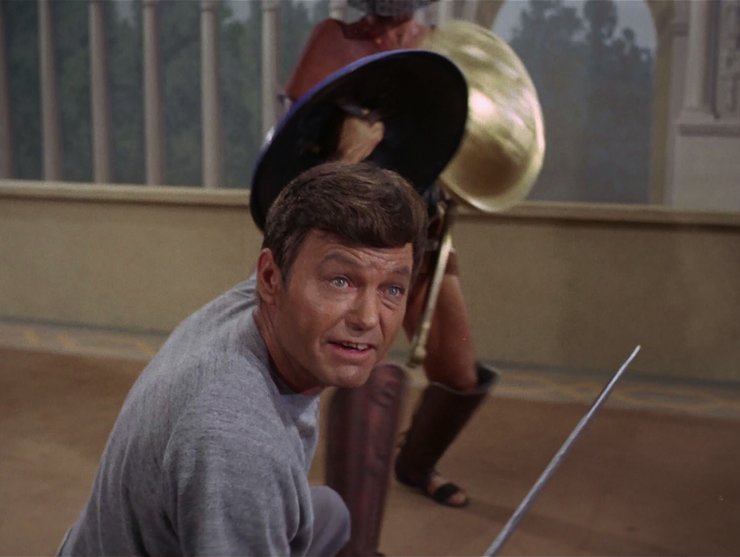
I’m a doctor not an escalator. The gladiator scene is one of McCoy’s most triumphant moments, with Flavius yelling at him to defend himself, and McCoy throwing his arms open and shouting “I am defending myself!” Followed, of course, by his taking the time from getting the shit kicked out of him to yell at Spock for the abject stupidity of asking him if he needs help.
Hailing frequencies open. Uhura’s the one who discovers that the sun worshippers are actually son worshippers, mostly by listening to talk radio, which—if it’s anything like twentieth-century Earth, and we know it is, since Spock made sure to mention it five hundred times in the first fifteen minutes—means she got a pretty skewed view of it…
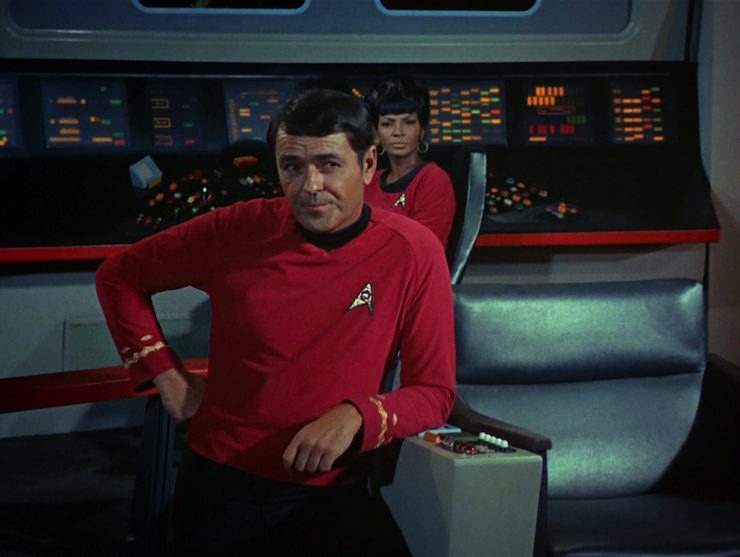
I cannot change the laws of physics! Scotty refuses to take “no” for an order and goes ahead and interferes despite Kirk telling him not to. But he does it subtly enough that everyone gets away unscathed.
It’s a Russian invention. When Kirk orders Chekov to trace the course of the Beagle‘s debris, Chekov announces that he already did so and it’s on the board. The kid obviously is taking the initiative…
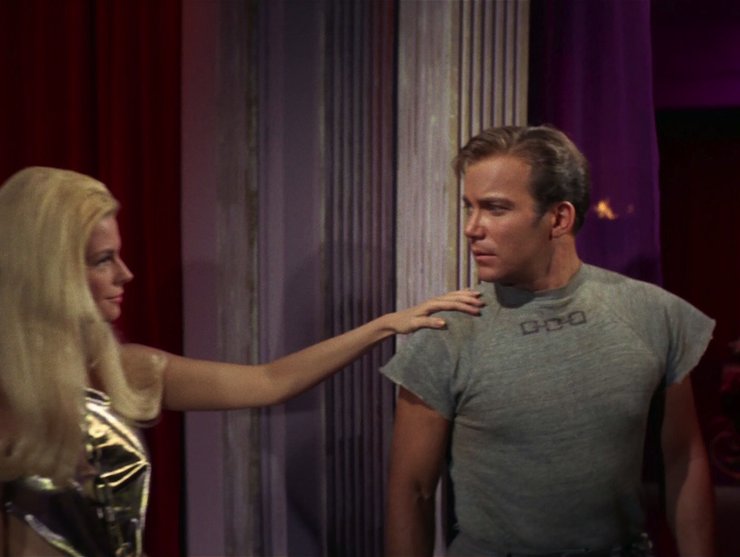
No sex, please, we’re Starfleet. Spock and McCoy languish in a prison cell. Kirk gets a comfy bed with a hot blonde in it. It’s good to be the captain, I guess…
Channel open. “What do you call those?”
“I call them ears.”
“Are you trying to be funny?”
“Never.”
Flavius and Spock discussing otology.
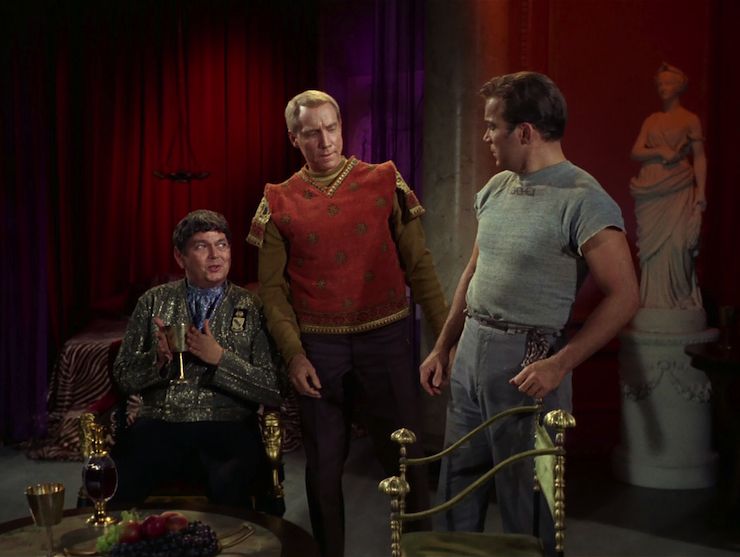
Welcome aboard. William Smithers is appropriately pathetic as Merik, Logan Ramsey is fittingly slimy as Claudius, Ian Wolfe is simply beatific as Septimus, Rhodes Reason is sufficiently grumpy as Flavius, William Bramley and Jack Perkins are incredibly nasty as the cop and the overseer, respectively, and Lois Jewell is suitably sexy as Drusilla. Wolfe will return in “All Our Yesterdays” as Mr. Atoz.
Regular voice actor Bart LaRue plays the announcer of the games. LaRue previously did the voices of Trelane’s dad in “The Squire of Gothos” and the Guardian of Forever in “The City on the Edge of Forever.” He’ll appear again in front of the camera as a newscaster in “Patterns of Force” and lend his voice to both one of the Providers in “The Gamesters of Triskelion” and Yarnek in “The Savage Curtain.”
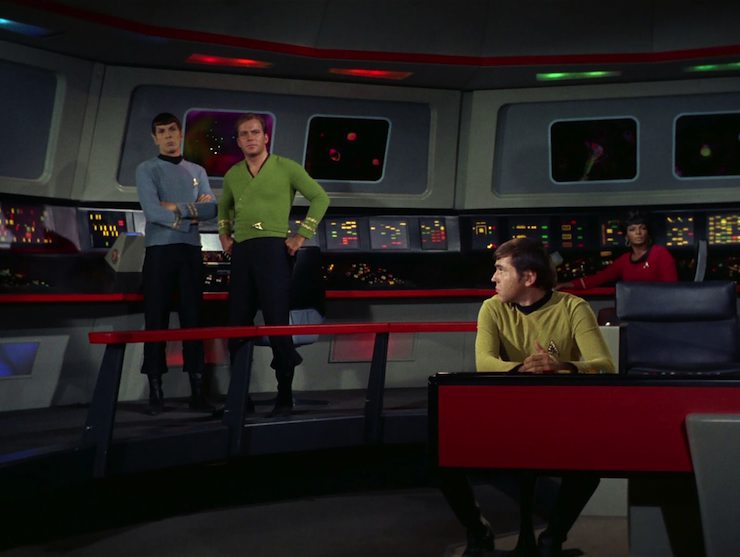
Plus we’ve got recurring regulars Nichelle Nichols, James Doohan, and Walter Koenig.
Trivial matters: This story was based on a treatment by John Kneubuhl, but he received no credit for it.
The title derives from Book IV of Juvenal’s Satires, specifically Satire X: “Wrong Desire is the Source of Suffering.”
Establishing shots of the city used footage of the Great Dome at MIT and Palais de la Légion d’Honneur in Paris.
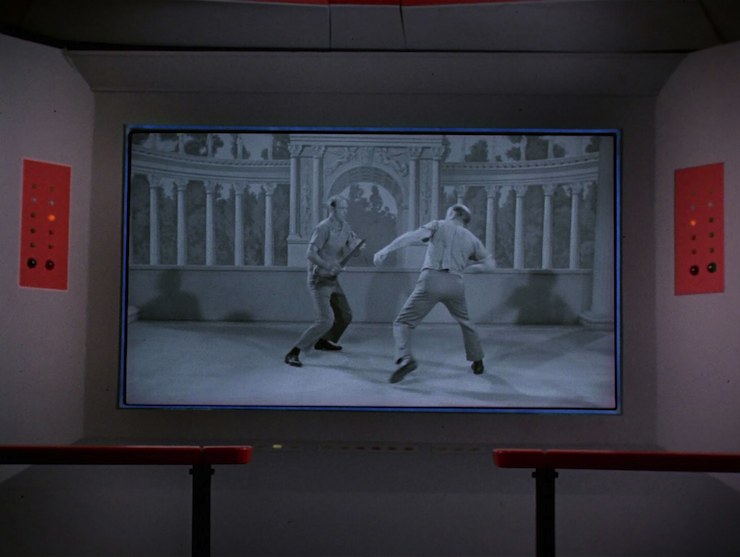
The planet was given the name Magna Romana in the tie-in fiction. The TNG novel The Captains’ Honor by Daniel & David Dvorkin establishes that Magna Romana joined the Federation in the twenty-fourth century, and Picard clashes with a Starfleet captain from that world named Lucius Sejanus of the U.S.S. Centurion. (That name is an amusing in-joke, since Sir Patrick Stewart played Sejanus in I, Claudius in 1976.) The world is also mentioned in The Autobiography of James T. Kirk by David Goodman.
This episode marked the beginning of the transition from Gene L. Coon to John Meredyth Lucas as the producer/show-runner. Lucas visited the location shooting for this episode, and would later report to Herbert F. Solow & Robert H. Justman for Inside Star Trek: The Real Story that he saw a great deal of consternation on the set, as none of the actors seemed to get along with any of the other actors, and none of them got along with Gene Roddenberry. Clashes with Roddenberry are the main reason why Coon left, and indeed Roddenberry was rewriting this very episode (originally a Coon script) during shooting.
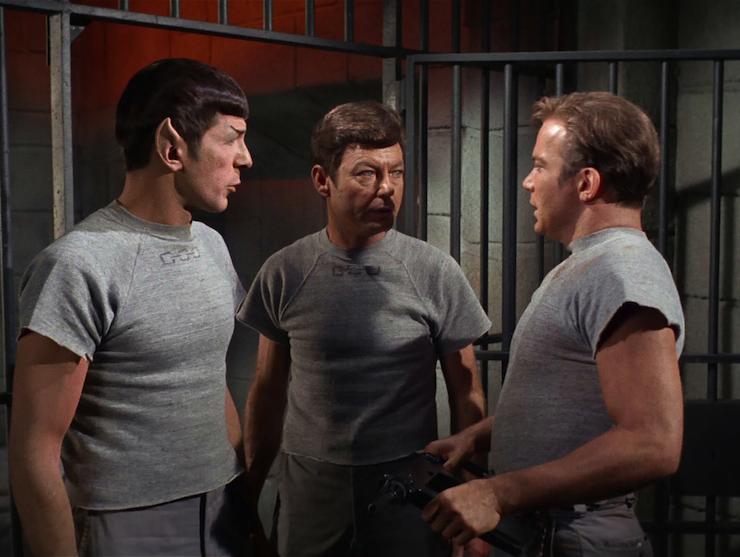
The caves where Septimus and his gang hang out are located just under the Hollywood sign. Those same caves were used for the entrance to the Batcave in Batman, among many other places.
To boldly go. “You may not understand because you’re centuries beyond anything as crude as television.” Parts of this episode are simply brilliant. The satire of television is spot-on and beautifully done. I particularly love the overseer threatening Flavius with having a special done on him if he hurts the ratings. McCoy is at his snotty best in this episode, and the dynamic among William Shatner, William Smithers, and Logan Ramsey is magnificently played: Shatner playing Kirk as calm, cool, and collected, just waiting for the right moment, and refusing to give in to Claudius’s baiting; Smithers showing the struggle Merik has trying to rationalize what he’s done, which was probably much easier to do before Kirk showed up, and realizing how badly he’s screwed up; and Ramsey’s Claudius is superbly slimy, but also makes the fatal flaw of many despots in assuming he’s the smartest person in the room even though he totally isn’t, particularly since he makes judgments on all Federation citizens solely on the basis of one especially mediocre example of the breed.
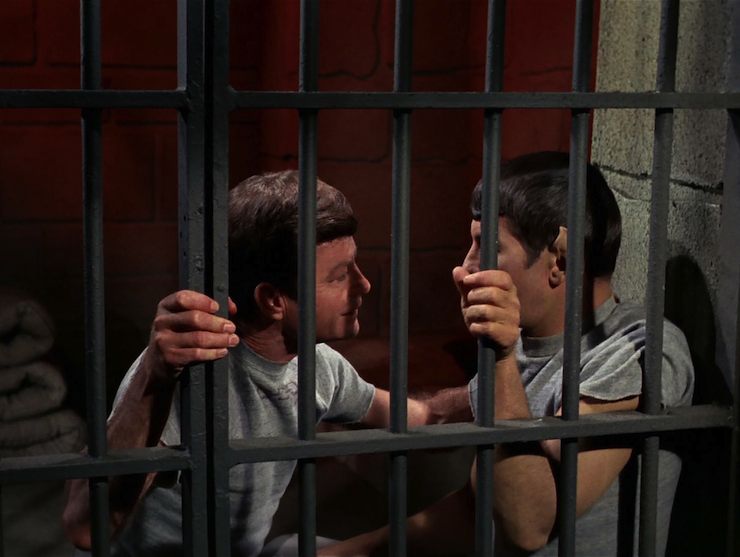
I’m of two minds about the Spock-McCoy banter. Flavius’s query as to whether or not they’re enemies is a legitimate one, as their mutual abuse tends toward the nasty. McCoy’s needling about Spock being scared of a “legitimate” human feeling is borderline racist, but Spock’s regular critiques regarding McCoy’s skill and professionalism aren’t exactly sterling examples of proper behavior toward a fellow officer, and his own colloquies on logic would seem to indicate that insulting the guy responsible for your health is the height of illogic. On the other hand, the moment when Spock all but admits that he’s worried about Kirk is a beautiful moment, and McCoy’s ranting in the arena is classic.
(I’m of one mind about Kirk going ahead and sleeping with Drusilla, and it’s disgust. There’s no excuse for his doing so, no reason for him to capitulate to Claudius’s awful views on what constitutes manliness, and no justification for having sex with a woman incapable of consenting to it of her own free will.)
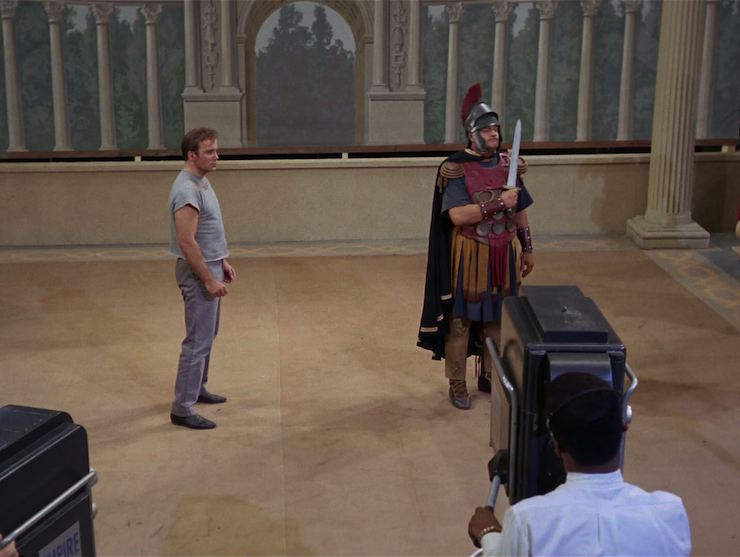
The parallel to Rome might have been more effective if the script didn’t hammer it home so relentlessly. Spock spends the first third of the episode going on and on and on about how much like Earth the planet is, down to them actually speaking English (a rare case where Star Trek even acknowledges the possibility of a language barrier, but it’s kind of necessary for the sun/son confusion to work), not to mention Kirk’s citing of “Hodgkin’s Law of Parallel Planetary Development,” a nonsense law created to justify copious use of Southern California locations, sets on existing backlots, and costumes lying around Desilu. They’ve dipped in this well before in “Miri,” and here at least it’s somewhat relevant to the plot, though it adds to the episode’s unfortunate sledghammeriness. (This will be handled better in “Patterns of Force” and “A Piece of the Action,” where the parallels are externally imposed, and worse in “The Omega Glory,” about which the less said the better.)
I also wonder why no mention was made of what to do with the members of Merik’s crew who were still alive and living on the world. Sure, they’d assimilated at that point, but probably because they saw that as a preferable alternative to the arena. What if they wanted to go home? It probably wouldn’t have been practical to do anything about them, but some discussion of them beyond their existence would not have been untoward.
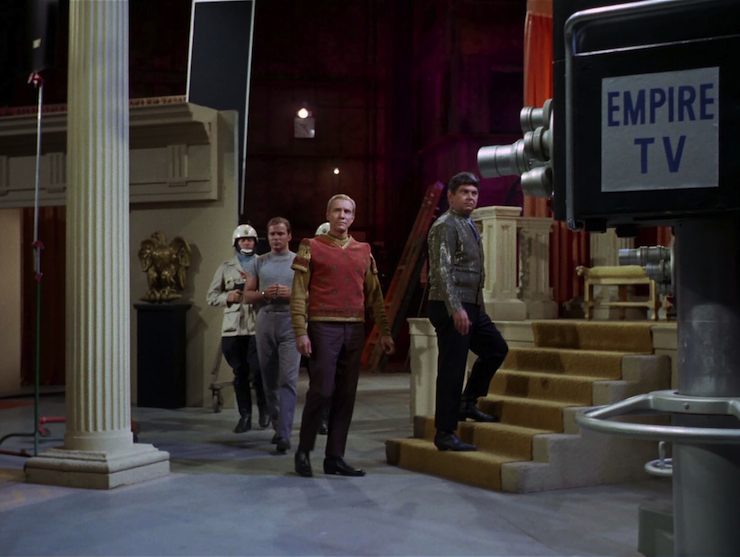
And while the Enterprise crew seem to view the coming of Christianity as a force for good—and the son/sun worshippers’ beliefs in peace and “brotherhood” (I guess women need not apply?) is certainly, as presented, very noble—all I can think while watching the ending is, “Great, the Inquisition should happen right in time to be livestreamed…”
Warp factor rating: 5
Next week: “Journey to Babel”
Keith R.A. DeCandido is the author of the new Marvel’s Tales of Asgard trilogy. Book 1, Thor: Dueling with Giants, is available now as an eBook, and you can preorder the print edition, which is due in March. You can also preorder the print edition of Book 2, Sif: Even Dragons Have Their Endings, and Keith is hard at work on Book 3, The Warriors Three: Godhood’s End.










